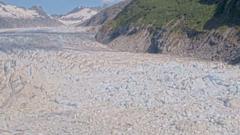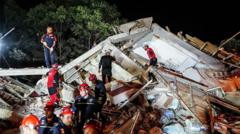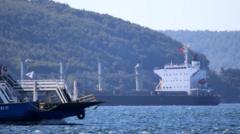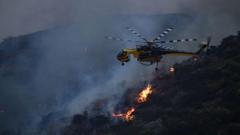As many regions in Italy, Spain, Portugal, and France reach unprecedented heat levels, wildfires devour forests and suburbs, prompting urgent evacuations and emergency responses.
**Southern Europe Faces Catastrophic Wildfires Amid Record-Breaking Heat Wave**

**Southern Europe Faces Catastrophic Wildfires Amid Record-Breaking Heat Wave**
A relentless wave of extreme temperatures surpassing 40 degrees Celsius is igniting catastrophic wildfires across southern Europe, displacing thousands and raising alarms about public health.
In a rapidly escalating crisis, wildfires are wreaking havoc across southern Europe due to soaring temperatures, pushing several countries to the brink.
The blistering heatwave currently gripping southern Europe has led to a series of devastating wildfires, causing evacuations, health warnings, and tragic fatalities. With temperatures climbing beyond 40C (104F), red heat alerts are being issued throughout Italy, Spain, Portugal, and France, notably with forecasts suggesting potential peaks of 44C (111.2F) in regions such as Seville and Cordoba, Spain. Tragically, the dire heat has resulted in the loss of life, including a child in Italy and a man in Spain due to severe burns.
In Spain, authorities have reported numerous wildfires, prompting evacuations in areas like Tres Cantos, where dry storm conditions contributed to fire spread. Spanish Prime Minister Pedro Sanchez emphasized the ongoing efforts of rescue teams battling the flames and urged the public to be vigilant against forest fires. Similarly, nearly 4,000 residents in Castile and Leon were evacuated due to threatening blazes, endangering natural heritage at sites like Las Medulas, a UNESCO World Heritage site.
In Portugal, firefighters are grappling with three significant fires, particularly in Trancoso, where more than 1,300 firefighters are actively involved in combating the flames, aided by international support from Morocco's air assistance. Meanwhile, Italy is bracing for symptoms of heatstroke as temperatures soar, already contributing to deadly outcomes, while France faces rising emergency levels with nearly three-quarters of the country on alert.
The impact of fierce winds is also being felt, particularly in Greece, where wildfires on tourist islands have led to evacuations from hotels and residential areas. Similar circumstances affect Turkey, where a significant fire in Canakkale has driven residents from their homes, and authorities are implementing extensive firefighting measures to manage the blaze.
Calls for action have grown stronger as scientists warn that global warming is contributing to increasingly hotter and drier Mediterranean climates, resulting in prolonged and intense wildfire seasons. This reality raises critical questions about the future and risks of climate-induced natural disasters across the continent.
The blistering heatwave currently gripping southern Europe has led to a series of devastating wildfires, causing evacuations, health warnings, and tragic fatalities. With temperatures climbing beyond 40C (104F), red heat alerts are being issued throughout Italy, Spain, Portugal, and France, notably with forecasts suggesting potential peaks of 44C (111.2F) in regions such as Seville and Cordoba, Spain. Tragically, the dire heat has resulted in the loss of life, including a child in Italy and a man in Spain due to severe burns.
In Spain, authorities have reported numerous wildfires, prompting evacuations in areas like Tres Cantos, where dry storm conditions contributed to fire spread. Spanish Prime Minister Pedro Sanchez emphasized the ongoing efforts of rescue teams battling the flames and urged the public to be vigilant against forest fires. Similarly, nearly 4,000 residents in Castile and Leon were evacuated due to threatening blazes, endangering natural heritage at sites like Las Medulas, a UNESCO World Heritage site.
In Portugal, firefighters are grappling with three significant fires, particularly in Trancoso, where more than 1,300 firefighters are actively involved in combating the flames, aided by international support from Morocco's air assistance. Meanwhile, Italy is bracing for symptoms of heatstroke as temperatures soar, already contributing to deadly outcomes, while France faces rising emergency levels with nearly three-quarters of the country on alert.
The impact of fierce winds is also being felt, particularly in Greece, where wildfires on tourist islands have led to evacuations from hotels and residential areas. Similar circumstances affect Turkey, where a significant fire in Canakkale has driven residents from their homes, and authorities are implementing extensive firefighting measures to manage the blaze.
Calls for action have grown stronger as scientists warn that global warming is contributing to increasingly hotter and drier Mediterranean climates, resulting in prolonged and intense wildfire seasons. This reality raises critical questions about the future and risks of climate-induced natural disasters across the continent.



















